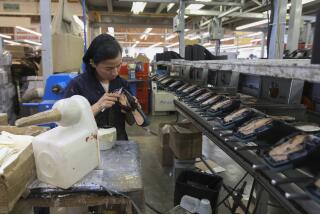Plain PCs Sitting Pretty
Victor Salazar didn’t call Dell or drive to the Apple store when he needed to buy a desktop computer.
He headed to La Plaza de la Computacion, a warren of tiny retail stalls jammed inside a weathered building near the capital’s historic center. Here, mom-and-pop vendors hawk locally assembled, generic PCs, many of them cobbled together on the premises.
On a recent afternoon, Salazar was leaning toward a model built by Sumitel, a Mexico City-based PC maker. The company offered a basic system with an Intel processor, a Windows operating system, a 15-inch monitor, a keyboard, a mouse and speakers for $381. The most economical Dell desktop available in Mexico is faster and has more memory, a bigger monitor and other extras. It is also nearly 30% more expensive -- out of the reach of Salazar’s budget.
“They don’t care about a brand name,” said Salazar, who was buying the computer for a family friend with three children. “They want something reliable and cheap.”
The names Sumitel, Lanix and Texa are not likely to ring many bells in Silicon Valley. But these and other homegrown manufacturers dominate the business in Mexico. And they continue to grab market share from the better-known brands by selling what are known in the industry as “white-box” computers, named for their generic, unadorned exteriors.
Domestic models will account for nearly 60% of the 3 million personal computers projected to be sold in Mexico this year, up from more than 44% in 2000, according to the Massachusetts technology consulting firm International Data Corp.
The preference for locally assembled computers is even more pronounced in Latin America as a whole. IDC estimates that 13 million desktop and notebook computers will be sold in the region this year, more than 70% of them produced locally.
In the United States, white-box makers account for only about one-third of desktop sales and are losing their share in the overall PC market because of explosive growth of name-brand notebooks.
For many buyers in developing countries, choosing a white-box largely comes down to price.
Multinationals that export technology products to countries such as Mexico often must pay freight, customs duties and other fees, putting them at a disadvantage to domestic producers.
Dell, for example, is selling an entry-level desktop on its U.S. website for $249, a price that even the savviest white-box maker would have a hard time matching. But it cannot offer that price on products shipped south of the border because of other expenses, said Paulina Lopez Noriega, a company spokeswoman based in Mexico City.
“We have to pay import taxes, we have to pay shipping and we have to pay IVA,” said Lopez, referring to Mexico’s 15% value-added tax. “Those are the things that make our products look more expensive.”
Then there’s piracy.
The Latin American market is teeming with shady operators whose bargain prices stem from copied software, purloined operating systems, counterfeit components and tax evasion.
The black market trade is so brazen in and around La Plaza de la Computacion that itinerant vendors will accompany customers to local fast-food restaurants and help them load copycat programs on their laptops. Mexico’s attorney general last year seized pirated merchandise from more than 100 stalls and hawkers in the plaza.
Still, reputable companies have emerged throughout Latin America that are rivaling industry giants on quality and beating them on support.
In contrast to the early days of the PC revolution, when hundreds of manufacturers churned out computer parts of varying reliability, consolidation has left the industry with fewer, stronger suppliers. Thus white-box makers often are buying the same components as well-known manufacturers, helping them to narrow the quality gap.
Oscar Guerra, a 37-year-old computer buff, was at La Plaza de la Computacion recently looking to buy more memory for his computer. He said his no-name desktop had the same Intel processor and Windows operating system as a brand name, but it cost him a lot less money. Guerra said a network of small vendors had helped him soup up his machine and provided quick service when something went wrong.
“I can’t imagine waiting on the phone for an hour for a technician” at some big company, he said. “It’s easier to come down here. These guys know me.”
Personal attention is the reason small businesses and government offices in Latin America frequently choose local computer makers, said Jay Gumbiner, a Latin America expert with IDC.
“A lot of small companies don’t have a help desk,” Gumbiner said. “These white-box companies are like their IT department.”
Assemblers such as Sumitel have found a niche by growing large enough to offer customers many of the benefits of a major manufacturer -- warranties, name-brand components, online ordering and telephone support -- while continuing to best the multinationals on price.
Sumitel founder Daniel Dabbah got his start in the business as a teenager in the early 1990s selling computer accessories and building a few desktops for clients. Today, the company has 75 employees and nine retail stores. It is expected to post sales of about $18 million this year.
The company’s cramped headquarters in La Plaza de la Computacion functions as its manufacturing center as well as a humming retail hub.
Seven popular configurations of its PCs are always in stock. But customization is no problem. Customers who belly up to the counter to place a special order with one of a dozen yellow-shirted salespeople can usually get their computer assembled and delivered within an hour.
“Speed is one of our advantages,” Dabbah said.
Financing also helps push white-box sales. Mexican appliance and electronic giant Grupo Elektra last year launched Blue Light, a line of personal computers that are assembled by City of Industry-based Avatar Technology Inc. Elektra expects to sell more than 100,000 of the machines in 2006, nearly two-thirds of which will be financed through the company’s in-house credit arm.
Only about 2 in 10 households in Latin America own a PC, leaving plenty of room for growth. But analysts say that maintaining an edge could be a challenge for the region’s manufacturers .
In the United States, sales of desktop computers have stagnated while the notebook market is expected to grow by more than 30% this year and outsell desktops by the end of the decade. The problem for white-box manufacturers is that consumers so far have shown little interest in buying generic notebook computers. The price differential is so small that buyers are sticking with name-brand machines.
Notebook computers are still cost-prohibitive for most consumers in Latin America and represent less than 10% of unit sales in the region. But in Mexico, laptops already account for 1 in 6 computers sold and are the fastest-growing segment of the market.
To that end, Sumitel and other Mexican firms are developing their own lines of notebooks. Dabbah said sales so far were minuscule, but he believed that consumers would eventually come around.
“If we offer them a quality product at the right price, they’ll buy it,” he said.






